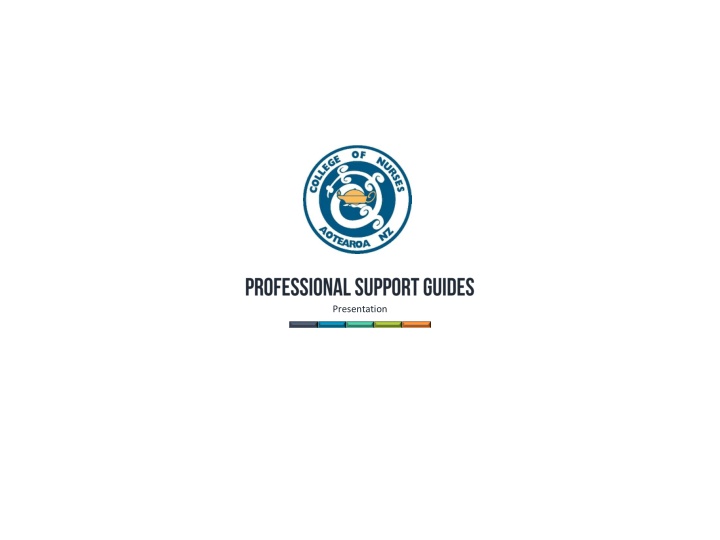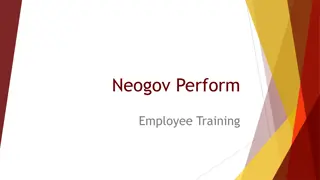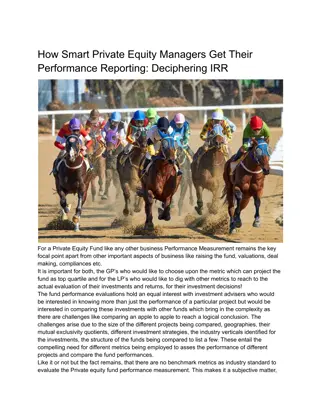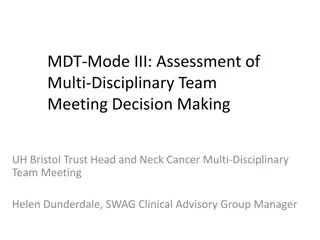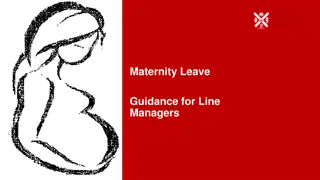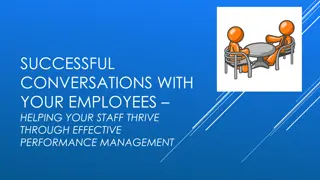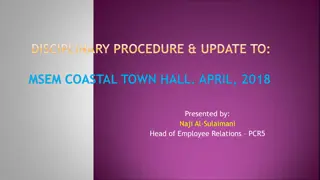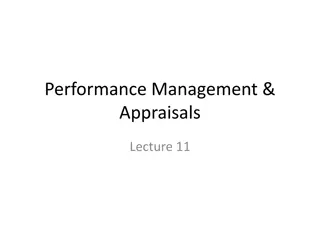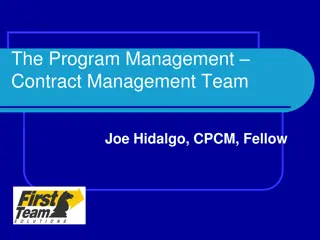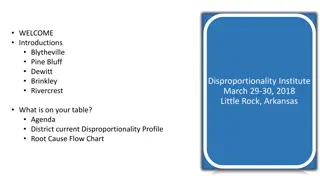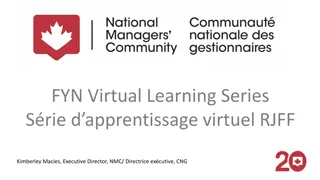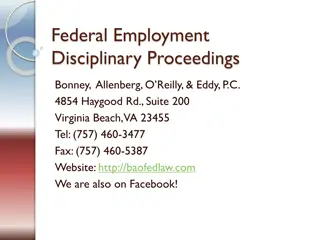Effective Performance Management and Disciplinary Processes for Employers and Managers
Learn how to successfully manage performance improvement and disciplinary processes in the workplace. From setting clear performance goals to handling disciplinary issues with fairness and transparency, this guide provides essential tips and best practices for employers, managers, and nurse leaders. Discover key strategies for addressing performance issues, conducting disciplinary procedures, and ensuring employees are aware of expectations and consequences.
Download Presentation

Please find below an Image/Link to download the presentation.
The content on the website is provided AS IS for your information and personal use only. It may not be sold, licensed, or shared on other websites without obtaining consent from the author.If you encounter any issues during the download, it is possible that the publisher has removed the file from their server.
You are allowed to download the files provided on this website for personal or commercial use, subject to the condition that they are used lawfully. All files are the property of their respective owners.
The content on the website is provided AS IS for your information and personal use only. It may not be sold, licensed, or shared on other websites without obtaining consent from the author.
E N D
Presentation Transcript
Employer: How to manage performance improvement or disciplinary processes Employee: How to engage successfully in a performance improvement process Dealing with a disciplinary process
For employers/ managers/ nurse leaders How to manage performance improvement processes disciplinary processes
Stop, gather information, plan Performance management or disciplinary issues can be extremely challenging. Do not blunder into a performance management process. www.nurse.org.nz
Defining performance issues Performance management? Disciplinary? VS Organisational process to ensure employees are aware of the level of performance expected of them in a role, as well as any specific objectives they will need to achieve overall objectives and/or regulatory competencies. Encompasses performance improvement plans and processes. A process for dealing with perceived employee misconduct. Organisations will typically have a range of disciplinary procedures depending on the severity of the transgression. www.nurse.org.nz
Performance management? A good employer will .. Ensure the staff are fully aware of performance goals and expected behaviour If issues with practice are identified, meet to discuss and set an agreed, fair and reasonable, time-framed, goal orientated plan Ensure the employee has opportunity and time to meet the goals e.g. training, supervision. Be fair and transparent about consequences on non achievement of agreed goals. Stick to the plan: Review the plan and goals in the timeframe agreed. Any change to the plan must be agreed between both parties Staff need to be informed if their practice or behaviour is not meeting standards. If a nurse is unaware he/she is not meeting standards how can they improve? www.nurse.org.nz
Disciplinary? Some key tips Act in good faith. A good employer will have policies and procedures for performance management which are underpinned by legislation. Don t deal with extraneous, irrelevant issues or hearsay, only use the facts Check process with your HR department or relevant senior manager (if appropriate). Keep all documentation. There may be an informal meeting followed by a formal investigation. Gather all the information you need. Retain copies of all conversations, texts, emails and meetings. Take minutes of face to face meetings and notes of telephone calls. Keep the investigation and information confidential. Deal only with the specific issue at hand. In a formal disciplinary meeting make sure the staff member has a fair chance to respond to the allegations. They may advise obtaining legal advice to make sure you and the organisation are kept safe. Employers must stick to policy, fair process and natural justice. Don t muddy the waters, remain neutral. Stay 100% professional and impartial. Start considering your course of action, plan ahead. You must have a support person in formal disciplinary meetings. See next slides for process .
A 10 step template process to follow.. This is only a template for a disciplinary process, it doesn t replace your organisational processes if you have them. Ask the staff member to attend to let them know the allegations and that you will carry out a formal investigation. Minutes are not required, but note you have had the meeting. Gather all the information your can around the allegation e.g. documents, notes, statements. Fully review what you have found throughout the investigation. Focus on the original allegation. Get advice to help make your decision from another manager or in some cases, from a legal advisor. www.nurse.org.nz
to the staff member informing them of either: (a) Insufficient evidence to proceed or (b) Invite to a disciplinary meeting. Include that they have a right to bring a support person. Suggest a date and time (be prepared to reschedule if required, but not indefinitely). Include all information gathered during the investigation for their consideration. Review all the evidence again before the meeting Do not attend alone. Make it clear who is leading the proceedings and who is the note taker. Stick to the points made in the disciplinary letter. Don t go off on a tangent. Read out aloud the letter they were sent. Review all the evidence from the investigation. Offer the opportunity to respond. Once they have responded and have no more to say, take an adjournment. www.nurse.org.nz
Consider the matter now you have feedback from the staff member involved. Come to a decision based on your evidence and their feedback. If unable to make a decision e.g. more investigation is now indicated, then take a prolonged adjournment. Agree a time/ date to reconvene. Present any further evidence gathered (if this is the case). Tell them your decision. This may range from: No action Written warning Final written warning Dismissal. Allow them time to respond. If you are able, get them to sign the hand written minutes as a true record. If they ask, provide a transcript and copy of hand written minutes. Send a formal letter to confirm the outcome of the process. www.nurse.org.nz
When to contact Nursing Council .. The Council s role is to protect the health and safety of the public by ensuring that nurses are competent and fit to practise. The Council carries out this role by considering the competence, health or conduct of a nurse and deciding whether the nurse should have to comply with certain conditions in order to practise. An employer should not use referral to Nursing Council as a proxy for carrying out a robust performance improvement or disciplinary process. Examples of internal disciplinary triggers may include; not following policy or procedure, repeated lateness, rudeness, bullying or failure to follow reasonable instructions from a Manager. Generally speaking a performance improvement or internal disciplinary process should precede consideration of referral to Nursing Council. The Nursing Council website provides comprehensive information on when to contact them about a nurse. Competence, conduct, health, HRANZ guidelines for Competence Referrals (2010), court convictions, practicing without an APC, practicing outside scope, breaching conditions, Health Practitioners Disciplinary Tribunal. http://www.nursingcouncil.org.nz/Employers/Fitness-to-practice
For employees How to engage successfully in a performance improvement process Dealing with a disciplinary process
Aim for a positive outcome It s okay to ask for help Talk to friends or family. Get professional support and advice. Consider taking a support person to meetings Use the Employee Assistance programme (EAP) or Take time to reflect on your practice what could you do better? Listen carefully to feedback Are you meeting your regulatory requirements the Nursing Council competencies for your scope? Are you providing the best care possible for your patients? similar services Do you need a support person? Is the improvement plan clear to you? Does the plan give you timeframes, measurable goals and opportunity to meet those goals? Is the process fair and transparent? Once you have agreed to a plan focus on the goals and how to achieve them. If you are struggling to meet them, keep your employer informed. This can be a challenging time, so remember to take care of yourself. Remain 100% professional and focus on improving your practice. www.nurse.org.nz
How to approach It s okay to ask for help Get professional support and advice. Take a support person to meetings Use the Employee Assistance programme (EAP) or similar services Focus your response to the issues raised in the disciplinary notification. Gather all relevant information, which could be from document review, staff interview or third party evidence. Ensure you have read all the evidence provided by your employer to allow you to respond fully to the allegation. Don t forget you can appeal a disciplinary decision if you feel you have not been fairly treated through the process, this is initially through a more senior manager in the organisation but ultimately you have the right to lodge a personal grievance. This can be a challenging time, so remember to take care of yourself. Remain 100% professional. www.nurse.org.nz
http://www.nurse.org.nz/ admin@nurse.org.nz
Check out our other professional support presentations About us Portfolios Bullying
